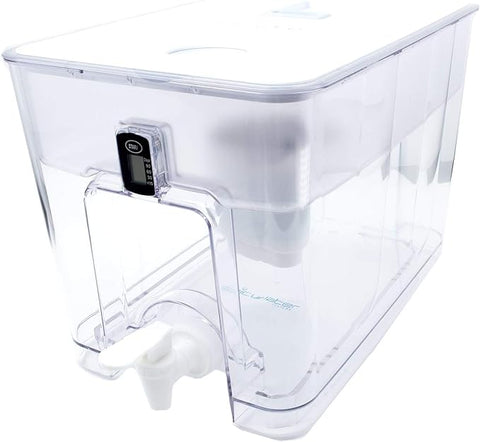Best Fluoride Water Filter: Lab Test Review of Top Filters & Brands
Fluoride water filter lab test review
In our last review of jug filters, we tested how well the top filters removed lead. We were surprised to find that their effectiveness varied greatly!
We’re now turning our eye towards fluoride removal. Whilst almost all drinking water filters claim to be able to remove contaminants such as heavy hetals, fluoride is much more difficult to remove. However, a few filters available in the UK do claim to remove fluoride, so we’re putting them to the test in our lab.
To gain a baseline we looked at the UK's leading filter, Brita. In their marketing, Brita doesn’t make any claims about their filter's ability to remove fluoride so we’re not expecting it to remove much.
Disclaimer: We are not affiliated, associated, authorised or endorsed by, or in any way officially connected with any of the companies or products mentioned in this article. We took due care and attention with our testing and present the results identified under our test conditions; we acknowledge that different results may be obtained under different test conditions.
Do you need to use a fluoride filter?
The UK's current water quality regulations set a ‘prescribed concentration’ for fluoride of 1.5 parts per million (ppm). Most UK tap water has low levels of fluoride, so filtering it is not a priority for most people.
Here’s where things get controversial, in some parts of the country fluoride is artificially added to the water. Water fluoridation began in the UK in the 1950s after researchers found that areas with less fluoride in drinking water had more childhood tooth decay.
Many people object to water companies artificially fluoridating their tap water, which remains highly controversial. Fluoridation can cause dental fluorosis in children, which leads to discoloured or pitted teeth. Some groups are worried about fluoride building up in the body, especially in the pineal gland of the brain.
We think that It's important for consumers to have the option to choose whether they want to drink water with fluoride or not. A water filter that removes fluoride could therefore be a helpful product.
How do fluoride water filters remove fluoride?
Distillation and reverse osmosis are highly effective methods for removing fluoride, but how can a simple jug filter remove fluoride? Potentially by using ion exchange resins!
Ion exchange resins come in two broad categories, cation exchange resins and anion exchange resins. Most water jug filters use exchange resins and activated carbon to remove harmful ions like lead, nickel, and manganese.
However, fluoride is an anion, it has a negative charge. To remove fluoride, you need a specialist anion exchange resin that isn't commonly found in most water filter systems.
Brita
Brita has been manufacturing water filters since the 1960s. Brita’s headquarters are in Oakland, California, but they’re the most recognised water filter brand in the UK. We bought the popular 2.4L Marella filter jug (that came with 3 Maxtra Pro cartridges) for £23.99. The Brita was the cheapest of the filters we tested.
Brita's marketing says the Maxtra Pro filter has natural microcarbon from coconut shells and powerful ion-exchange resin pearls. These help soften water, protect appliances, and reduce metals like lead and copper. Their marketing makes no claim that the filter removes fluoride.
Klar
The Klar filter was the most expensive we tested, we picked one up from Amazon for £44.99. The Klar is marketed on Amazon with the headline ‘Fluoride Water filter Pitcher 3.5L – Removes Fluoride, Lead, Microplastics, PFOA, PFAS, Pesticides - Alkaline PH by Klar Water’ and claims it ‘Filters 95% of fluoride in tap and bottled water – Independently tested in the UK’.
On Klar’s website they have a ‘How it works’ section that includes a cutaway diagram of their filter cartridge and some of the materials they’ve used: ‘ion exchange resin’, ‘bacterial inhibitors’, ‘activated carbon’, ‘mineral balls’, ‘microplastics filter membrane’ and ‘fluoride filtration’.
Klar include a water test result page on their site from an independent lab. The test results show ‘Klar Water’ as having 0.01 milligrams per litre (equivalent to parts per million). However, there’s no indication of the concentration of the fluoride in the water before it was filtered and therefore doesn’t provide any support for the claim of removing 95% of fluoride.
AddAcsaCI
The AddAcsa filter retailed at £29.88 and is marketed on Amazon under the headline of ‘AddAcsaCI Water 7+ Alkaline & Fluoride Water Filter JUG’. The filter claims to help reduce levels of “Fluoride, Chlorine, Limescale, Herbicides, Pesticides, Lead and other heavy metals in tap water, while retaining and increasing essential and necessary elements for the human body, like Magnesium, Zinc, Potassium, Selenium and others.”
The AddAcsaCI makes no claim about the percentage of fluoride it removes but as fluoride is mentioned in it’s headline we were hoping that it would perform well in our group test. Similarly to the Kar filter, the AddAcsaCI also displays a water report from an independent lab that shows the fluoride concentration of filter water as 0.12 parts per million. However, there’s no indication of how much fluoride is present in the water before it’s filtered, so again there’s no evidence of the percentage of fluoride the filter might remove.
Epic Pure
At the time of our testing the Epic Pure jug filter was out of stock, so we purchased the Epic Pure Countertop filter which uses the same filter cartridge and has a larger capacity. The Epic is sold on Amazon for £55 and their marketing headlines claim to remove Fluoride, Chlorine & Lead.
On Epic Water Filters' website they provide a water test report which usefully shows the fluoride concentration of the water both before and after filtration. The Epic filter is tested using the US testing standard NSF (national sanitation foundation) /ANSI (American National Standard Institute) 42, 53 and 401. The NSF method starts with water that’s been fluoridated to a level of 5 ppm, a level much higher than we would typically find in the UK; the lab report indicated 97.88% removal of Fluoride.
How we tested the fluoride filters
To test the filters, we first prepared the filter cartridges by following the manufacturer’s instructions. We then used fifteen litres of fluoridated water with fluoride present at a concentration of 1 part per million (or 1 milligram per litre). We chose 1 ppm as this is a typical fluoride level for artificially fluoridated water in the UK.
We primed the filters by running two litres of our fluoride solution through each and we discarded it. We then filtered two litres of the 1 ppm fluoride solution through each filter and analysed three samples of the filtered water using a sensitive laboratory technique called ion chromatography.
Which was the best water filter for removing fluoride?
So, which was the best filter for fluoride removal? Does a Brita filter remove fluoride at all? The results from the lab were mixed with most of the filters showing little fluoride reduction at all.
Fluoride Removal
The hands down winner in our test was the Epic, which in our test removed over 91% of the fluoride. In the test we conducted we couldn’t replicate the 97.88% from the Epic’s test lab but it’s still an impressive result and is undoubtedly a very effective filter.

We were not surprised that the Brita could only remove 5.4% of the fluoride as it made no claims with respect to fluoride removal and is therefore unlikely to be using the anion exchange resins needed to remove fluoride.
In our tests the Klar and the AddAcsaCi filters did not perform so well. We contacted Klar to discuss our results and they confirmed that their testing had shown a reduction of around 90%. We don’t have details of the conditions Klar used to test but we note that the percentage of fluoride removed can vary depending on the initial concentration. We were unable to contact AddAcsaCi but note that they make no specific claim about the amount of fluoride their filter removes.





















